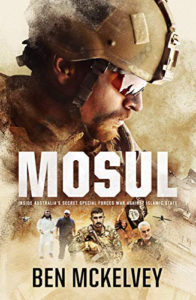Reviewer: Dr John Battersby
Review published in National Security Journal, 29 August 2021
Download full PDF version – Mosul: Australia’s Secret War Inside the ISIS Caliphate (463 KB)
Ben McKelvey, Mosul: Australia’s Secret War Inside the ISIS Caliphate, Hachette Australia (Sydney, 2020). ISBN978-0-7336-4541-9. 339 pages.
 Mosul: Australia’s Secret War Inside the ISIS Caliphate looks at parallel paths in the Al Qaeda (AQ) and ISIS inspired conflicts of the 2000s. On the one hand, it looks at those who were lured by AQ and ISIS propaganda into conceiving plots in Australia (a number were caught in the Pendennis operation), while another killed a civilian employee in October 2015 and several others left Australia to fight in Iraq and Syria in the period of ISIS’s ascendency. At the same time McKelvey relates the coinciding story lines of a number of Australian special forces personnel who were deployed to Afghanistan in 2001 and after 2003 (including the mid-2010s) to Iraq. Their exploits are detailed, the rationale for their deployment and operations is given, and light is shone on the consequences for those individuals personally. It is too often the fate of those who give their loyalty and commitment to their country, to discover that their country seldom reciprocates in equal measure. The inconsequential occasional mis-demeanours by highly disciplined servicemen that offend the sensibilities of their higher commanders were punished harshly, and the enormous personal and psychological toll that inevitably falls on individuals deployed to war-zones has not been adequately addressed by Australia. Service personnel surviving war zones to commit suicide when they come home is not an acceptable outcome of these deployments.
Mosul: Australia’s Secret War Inside the ISIS Caliphate looks at parallel paths in the Al Qaeda (AQ) and ISIS inspired conflicts of the 2000s. On the one hand, it looks at those who were lured by AQ and ISIS propaganda into conceiving plots in Australia (a number were caught in the Pendennis operation), while another killed a civilian employee in October 2015 and several others left Australia to fight in Iraq and Syria in the period of ISIS’s ascendency. At the same time McKelvey relates the coinciding story lines of a number of Australian special forces personnel who were deployed to Afghanistan in 2001 and after 2003 (including the mid-2010s) to Iraq. Their exploits are detailed, the rationale for their deployment and operations is given, and light is shone on the consequences for those individuals personally. It is too often the fate of those who give their loyalty and commitment to their country, to discover that their country seldom reciprocates in equal measure. The inconsequential occasional mis-demeanours by highly disciplined servicemen that offend the sensibilities of their higher commanders were punished harshly, and the enormous personal and psychological toll that inevitably falls on individuals deployed to war-zones has not been adequately addressed by Australia. Service personnel surviving war zones to commit suicide when they come home is not an acceptable outcome of these deployments.
Clearly in the background of this book are the serious allegations made against Australian special forces for unlawful killings of civilians – whether that occurred or not, McKelvey argues the case for the majority of those whose actions were authorised and deemed lawful, carried out against an organisation which observed no rules at all. “The fighters of Islamic State,” says McKelvey, “had no respect for the international laws of war, nor did they expect to live to face trial for breaching them….”It’s a fraught environment where one side faces severe consequences when it errs from the ‘rules’, and the other has no rules to observe.
For New Zealand readers this book is important. It has been noticeable since the 15 March 2019 tragedy in Christchurch, that kiwis now seem unconcerned about terrorism elsewhere. They are content to think that the ISIS threat of the 2010s was somehow exaggerated, and comprised ‘the wrong place to look’ in the wake of Brenton Tarrant’s unseen emergence. McKelvey reminds us that those risks were live and real…and they still are.
McKelvey observes that Australia did not appear so concerned about the absence of WMDs (despite the case for war in Iraq in 2003 being based on their alleged existence) and the subsequent political fall-out in Canberra was muted by comparison to London and Washington. A well-known controversy sprung up in the US over the killing of American citizen – Anwar Al Awkaki in 2011 by US drone strike – but no such debate occurred in Australia a few years later when Australian Mohammad Baryalei’s death occurred in a similar vein, with the apparent foreknowledge of the Australian Prime Minster. These are important differences in the Australian approach to a distant confrontation, from those of the US and UK, and certainly from New Zealand.
Questions linger after reading this book – did the Australian contribution in Afghanistan and Iraq inspire the increased terrorist threat they faced on home soil in the first two decades of the 21st century? How does the Australian ‘boots on the ground’ effort, which clearly contributed to the effective degrading of ISIS in the 2010s, compare with New Zealand’s reportedly ‘inside the wire’ training deployment? Does New Zealand avoid a similar level of home-soil terrorism because we did not do what Australia did, or did we accrue ‘free’ benefit from Australian actions because of ISIS’s depleted ability to incite such attacks? These two latter questions are not within McKelvey’s scope, but his narrative does seed them, after all New Zealand’s contribution is discussed in brief in the context of one of the mis-demeanours referred to above – which occurred on an RNZAF flight transporting Australians. Perhaps there is more to it, and after-all discipline is discipline and the rules are the rules– but the reader wonders – did such minor infractions really need to be reported up the chain of command?
By John Battersby
Centre for Defence and Security Studies
Massey University
_________________
